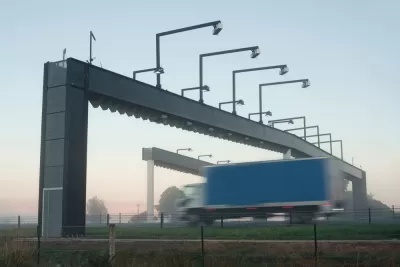Texas 130 has failed to live up to its revenue potential, leaving the private company that operates the road in junk bond status.

Katherine Blunt takes a deep dive in the revenue challenges facing SH 130 Concession Co., the private operator of the Texas 130 toll road.
According to Blunt, the company "hasn’t been able to shake the junk-bond rating Moody’s Investment Services assigned it two years ago because traffic counts on its sections have consistently failed to meet projections." Specifically, "Last year, traffic and revenue fell nearly 70 percent below the company’s original forecast, according to the ratings agency."
The article notes that traffic and revenue have been increasing slightly for several years, but not in enough quantity to rescue the company from its junk bond rating.
Blunt goes on to closely examine the toll road's shortcomings—in erms of its ability to attract the traffic necessary to make ends meet. Speaking of making ends meet, representatives from SH 130 Concession Co. blame a lack of "direct connectors" for the sluggish traffic levels. Blunt provides more context for how the road came into existence:
"TxDOT planned Texas 130 to relieve congestion between San Antonio and Austin on Interstate 35, a highway strained by population growth and cross-border trade. The department completed part of the road by 2006, but it didn’t have enough funding to build south of Mustang Ridge."
As for a more heavily travelled future for the toll road, the desired connector roads are still distant spots on the planning horizon:
"The Alamo Area Metropolitan Planning Organization has discussed the possibility of building a connector between I-35 and Texas 130 to makes the toll road more accessible from San Antonio. But City Councilman Ray Lopez, chairman of the MPO, said that project will likely take a back seat to other priorities in the area."
FULL STORY: Sparse traffic challenges Texas toll company

Alabama: Trump Terminates Settlements for Black Communities Harmed By Raw Sewage
Trump deemed the landmark civil rights agreement “illegal DEI and environmental justice policy.”

Planetizen Federal Action Tracker
A weekly monitor of how Trump’s orders and actions are impacting planners and planning in America.

How Atlanta Built 7,000 Housing Units in 3 Years
The city’s comprehensive, neighborhood-focused housing strategy focuses on identifying properties and land that can be repurposed for housing and encouraging development in underserved neighborhoods.

In Both Crashes and Crime, Public Transportation is Far Safer than Driving
Contrary to popular assumptions, public transportation has far lower crash and crime rates than automobile travel. For safer communities, improve and encourage transit travel.

Report: Zoning Reforms Should Complement Nashville’s Ambitious Transit Plan
Without reform, restrictive zoning codes will limit the impact of the city’s planned transit expansion and could exclude some of the residents who depend on transit the most.

Judge Orders Release of Frozen IRA, IIJA Funding
The decision is a victory for environmental groups who charged that freezing funds for critical infrastructure and disaster response programs caused “real and irreparable harm” to communities.
Urban Design for Planners 1: Software Tools
This six-course series explores essential urban design concepts using open source software and equips planners with the tools they need to participate fully in the urban design process.
Planning for Universal Design
Learn the tools for implementing Universal Design in planning regulations.
Jessamine County Fiscal Court
Caltrans
Institute for Housing and Urban Development Studies (IHS)
City of Grandview
Harvard GSD Executive Education
Toledo-Lucas County Plan Commissions
Salt Lake City
NYU Wagner Graduate School of Public Service



























